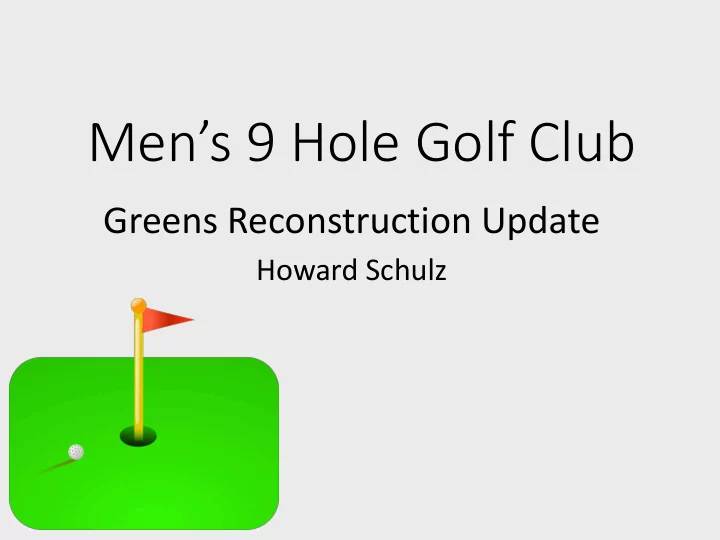

Men’s 9 Hole Golf Club Greens Reconstruction Update Howard Schulz
“Putting greens are to a golf course what a face is to a portrait.” CB Macdonald Golf Architect Shinnecock Hills
Existing Hole #1 le #1 COLOR % SLOPE Color Range Beg. Range End 0.00 1.50 1.50 2.00 2.00 2.50 2.50 3.00 3.00 4.00 4.00 5.00 5.00 100.00
Proposed Hole #1 le #1 COLOR % SLOPE Color Range Beg. Range End 0.00 1.50 1.50 2.00 2.00 2.50 2.50 3.00 3.00 4.00 4.00 5.00 5.00 100.00
Existing Hole #2 le #2 COLOR % SLOPE Color Range Beg. Range End 0.00 1.50 1.50 2.00 2.00 2.50 2.50 3.00 3.00 4.00 4.00 5.00 5.00 100.00
Proposed Hole #2 le #2 COLOR % SLOPE Color Range Beg. Range End 0.00 1.50 1.50 2.00 2.00 2.50 2.50 3.00 3.00 4.00 4.00 5.00 5.00 100.00
Existing Hole #18 le #18 18 Existing COLOR % SLOPE Color Range Beg. Range End 0.00 1.50 1.50 2.00 2.00 2.50 2.50 3.00 3.00 4.00 4.00 5.00 5.00 100.00
Proposed Hole #18 le #18 COLOR % SLOPE Color Range Beg. Range End 0.00 1.50 1.50 2.00 2.00 2.50 2.50 3.00 3.00 4.00 4.00 5.00 5.00 100.00
USGA Construction 4” G GRA RAVEL VEL DRAI RAIN LINE NE 12” M 12” MIX
California Method Construction FLA FLAT D DRAIN LI LINE
Golf Course Lifecycle ITEMS YEARS • Greens • 15 - 30 years • Bunker Sand • 5 – 7 years • Irrigation System • 10 – 20 years • Cart Paths –concrete • 15 – 30 years + • Practice Range • 5 – 10 years • Tees • 15 – 20 years • Bunker Drainage Pipes • 5 – 10 years Note: $5M invested at The Views over past decade
International Sports Turf Research Center Concept The I.S.T.R.C. System of developing a better understanding of the physical properties of sand-based greens, push-up greens, and athletic fields started in the spring of 1991. Working with hundreds of courses throughout the U.S., including 6 of the top 10, I.S.T.R.C. has built a strong database of information and knowledge.
Diagnosis of The Views Greens • Results are in and outlook is terminal • Push-up greens are at end of life • Subsoil won’t allow roots and salts to live together The Views Greens Well-Drained Greens * Water Infiltration (in/hr) 0.4 to 0.9 6 to 10+ Air Porosity (%) 7.5 to 9.2 20+ Feeder Roots below 4 in. None Medium Density * Competitor golf courses have “Well – Drained Greens • Three experts (agronomists) have same outlook • While surface grasses may look good, can’t be sustained • Not a question of “If”, but of “When” • Surgery (reconstruction) is best alternative
Many Options Considered • Re-doing grasses (top 4 inches) • Water Treatment Plant • Increased levels of plugging/tining • Reconstructing greens, but over 2 -3 year period • Reconstruct the greens in 2020 • Recommendation of committee • April –Oct timeframe for construction and grass grow-in • Cost of $ 1.2M
Key Considerations • Course has been on upward revenue and play trend • Course is being recognized for its’s merits by many new golfers • The Views • Challenging Layout • Excellent maintenance • Greens look good after over-seed – rain has helped • Deterioration seen in some areas prior to over-seed • The community to vote on the expenditure – March 2019
What a “Yes” vote means • Healthy greens will be face of the course for the future • Money is earmarked for project – no out-of-pocket assessment to homeowners • Continue to grow play and revenues • Results in continued financial results • Level playing field with competition
What a “No” Vote means • Greens will deteriorate over time • Unable to predict exact timing and extent of deterioration • Starting to see more signs – No 2 • Reputation of course will fall • Less play/memberships • Less revenues, increased costs • Cost to “do” is known, cost to “do nothing” can be worse
Need your help to educate • Want voters to make informed decision • Meeting with clubs now • Talk with Neighbors – info sheet coming • Look for opportunities to interact with non-golfers • Structured focus groups in Nov/Dec • Tipster Insert in January • Community communications in January/February (Mike Gogel will be here)
Recommend
More recommend